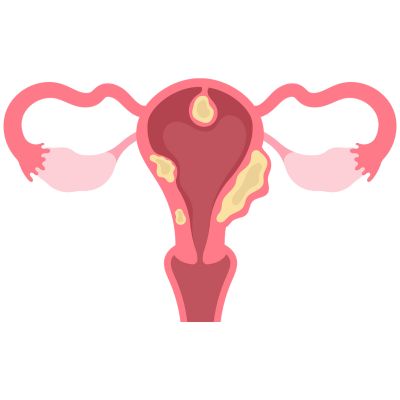Endometriosis Treatment
Severe pelvic pain that often intensifies during menstrual periods.You can request your preferred location when you contact us
Endometriosis is a condition where tissue that is similar to uterine tissue grows in places outside of the uterus, such as the ovaries, the fallopian tubes, bowels and other organs.
This causes severe pelvic pain that often intensifies during menstrual periods. Symptoms can start with a person’s first period and persist until menopause, severely impacting their quality of life.
Endometriosis symptoms include:
 Excess menstrual bleeding
Excess menstrual bleeding- Painful periods
- Abdominal pain and swelling
- Lower back pain
- Pain during and after intercourse
- Infertility
- Constipation
- Weight gain
- Fatigue
- Pain when opening the bowels
The only definitive way to diagnose endometriosis is through a laparoscopy, a minimally invasive surgery performed under general anaesthesia. This procedure not only confirms the diagnosis but also allows for the treatment of endometrial tissue, offering significant relief from symptoms and improving the chances of pregnancy.
Why choose KIMS Hospital?
At KIMS Hospital, our dedicated team of healthcare professionals is committed to delivering exceptional care to our patients. With the support of our consultants and state-of-the-art facilities, we strive to provide the highest quality of healthcare to the people of Kent.
To find out more about Endometriosis, and the benefits of choosing KIMS Hospital please get in touch with our friendly team.
Locations
You can see expert consultants and have a range of scans and tests at either one of the below facilities. If you need a procedure, this will be carried out at KIMS Hospital in Maidstone.
KIMS Hospital, Maidstone
Find out more about the facilities available at KIMS Hospital.
Sevenoaks Medical Centre
Find out more about Sevenoaks Medical Centre, our consulting and diagnostic facility for patients in West Kent.
The above are guide prices only.
Endometriosis FAQs
Can endometriosis disappear on its own?
It is unlikely that endometriosis can fade on its own, it is commonly a life-long condition which can affect women from their first period until the menopause.
What is the difference between endometriosis and adenomyosis?
The difference between the two is whether the tissue grows in or around the uterus. While endometriosis tissue grows on the outside of the uterus, adenomyosis occurs when tissue grows into the muscle of the uterus.
How are endometriosis and menopause linked?
Menopause can relieve symptoms of endometriosis due to the drop in oestrogen levels. However, new menopause related symptoms can emerge to replace them.
Can you have endometriosis without a period?
Endometriosis is an inflammatory disease, which means that you don’t have to have a period to experience it.
When does endometriosis need surgery?
Endometriosis is normally treated with medicine first, if that doesn’t work, then surgery becomes an option. Speak to your doctor or book a consultation with us to understand your options.
Can endometriosis cause infertility?
Endometriosis can reduce your likelihood of getting pregnant by 30 – 50%.

How to Advocate For Yourself: Navigating Endometriosis Care
In this article Gynaecology Specialist and Maidstone and Tunbridge Wells Endometriosis Centre Lead, Mr Ahmed El Gohari, gives an overview of endometriosis from causes and symptoms, to diagnosis and surgery.
- Make a general enquiry
- Appointment enquiry
Our team are on hand to help answer any queries you might have about coming to KIMS Hospital or Sevenoaks Medical Centre. You can use the form below and one of our team will be in touch. Alternatively to speak to a member of our team, please call 01622 237 727.
Enquiry hours are Mon-Thurs 8am-8pm, Fri 8am-6pm and Saturday 8am-4pm.
If you would like to book an appointment, you can use the form below and one of our team will be in touch.
Alternatively to speak to a member of our friendly team, please call 01622 237 500 between Mon-Thurs 8am-8pm, Fri 8am-6pm and Saturday 8am-4pm.
Please be aware, if you are requesting a diagnostic scan such as an MRI, or CT, you must have a referral from a relevant clinician or Allied Health professional such as a physiotherapist.